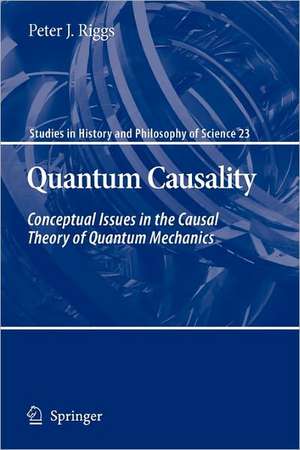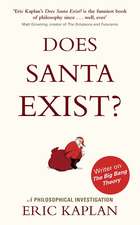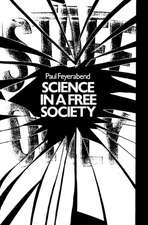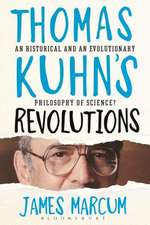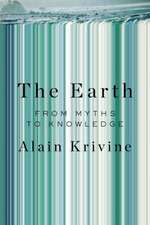Quantum Causality: Conceptual Issues in the Causal Theory of Quantum Mechanics: Studies in History and Philosophy of Science, cartea 23
Autor Peter J. Riggsen Limba Engleză Paperback – 22 oct 2010
| Toate formatele și edițiile | Preț | Express |
|---|---|---|
| Paperback (1) | 637.78 lei 6-8 săpt. | |
| SPRINGER NETHERLANDS – 22 oct 2010 | 637.78 lei 6-8 săpt. | |
| Hardback (1) | 643.99 lei 6-8 săpt. | |
| SPRINGER NETHERLANDS – 12 iun 2009 | 643.99 lei 6-8 săpt. |
Din seria Studies in History and Philosophy of Science
- 15%
 Preț: 650.19 lei
Preț: 650.19 lei - 15%
 Preț: 700.75 lei
Preț: 700.75 lei -
 Preț: 284.47 lei
Preț: 284.47 lei - 15%
 Preț: 702.24 lei
Preț: 702.24 lei -
 Preț: 389.88 lei
Preț: 389.88 lei - 18%
 Preț: 1222.94 lei
Preț: 1222.94 lei - 15%
 Preț: 647.08 lei
Preț: 647.08 lei - 15%
 Preț: 645.47 lei
Preț: 645.47 lei - 18%
 Preț: 956.33 lei
Preț: 956.33 lei - 18%
 Preț: 953.97 lei
Preț: 953.97 lei - 15%
 Preț: 646.11 lei
Preț: 646.11 lei - 15%
 Preț: 641.85 lei
Preț: 641.85 lei - 15%
 Preț: 644.49 lei
Preț: 644.49 lei - 18%
 Preț: 951.29 lei
Preț: 951.29 lei - 15%
 Preț: 647.40 lei
Preț: 647.40 lei - 18%
 Preț: 953.20 lei
Preț: 953.20 lei - 18%
 Preț: 946.87 lei
Preț: 946.87 lei - 18%
 Preț: 1384.56 lei
Preț: 1384.56 lei - 18%
 Preț: 1234.14 lei
Preț: 1234.14 lei - 15%
 Preț: 633.53 lei
Preț: 633.53 lei - 18%
 Preț: 1219.77 lei
Preț: 1219.77 lei - 24%
 Preț: 586.95 lei
Preț: 586.95 lei - 18%
 Preț: 967.56 lei
Preț: 967.56 lei - 15%
 Preț: 641.38 lei
Preț: 641.38 lei - 15%
 Preț: 642.68 lei
Preț: 642.68 lei - 15%
 Preț: 642.03 lei
Preț: 642.03 lei - 15%
 Preț: 641.85 lei
Preț: 641.85 lei
Preț: 637.78 lei
Preț vechi: 750.33 lei
-15% Nou
Puncte Express: 957
Preț estimativ în valută:
122.03€ • 127.43$ • 100.77£
122.03€ • 127.43$ • 100.77£
Carte tipărită la comandă
Livrare economică 15-29 aprilie
Preluare comenzi: 021 569.72.76
Specificații
ISBN-13: 9789048184972
ISBN-10: 9048184975
Pagini: 244
Ilustrații: XII, 230 p.
Dimensiuni: 155 x 235 x 13 mm
Greutate: 0.35 kg
Ediția:2009
Editura: SPRINGER NETHERLANDS
Colecția Springer
Seria Studies in History and Philosophy of Science
Locul publicării:Dordrecht, Netherlands
ISBN-10: 9048184975
Pagini: 244
Ilustrații: XII, 230 p.
Dimensiuni: 155 x 235 x 13 mm
Greutate: 0.35 kg
Ediția:2009
Editura: SPRINGER NETHERLANDS
Colecția Springer
Seria Studies in History and Philosophy of Science
Locul publicării:Dordrecht, Netherlands
Public țintă
ResearchCuprins
General Introduction.- Preliminaries.- The Causal Theory of Quantum Mechanics.- Energy and the Wave Field.- Energy-Momentum Transfer and the Quantum Potential.- The Exclusion Principle.
Recenzii
From the reviews:
“This text on the derivation of both the time dependent and time independent Schrodinger equations is breaking new ground concerning the single, 2D, and 3D quantum mechanical systems. It is very well written and superbly written for both student and expert … . the text will be of great value for future physicists, chemists, and other fields of science at both the introductory level, but also in addition to more advanced levels in both teaching/ research. I highly recommend this book for all readers.” (Joseph J. Grenier, Amazon.com, November, 2013)
“This text on the derivation of both the time dependent and time independent Schrodinger equations is breaking new ground concerning the single, 2D, and 3D quantum mechanical systems. It is very well written and superbly written for both student and expert … . the text will be of great value for future physicists, chemists, and other fields of science at both the introductory level, but also in addition to more advanced levels in both teaching/ research. I highly recommend this book for all readers.” (Joseph J. Grenier, Amazon.com, November, 2013)
Textul de pe ultima copertă
This is a treatise devoted to the foundations of quantum physics and the role that causality plays in the microscopic world governed by the laws of quantum mechanics. There is no sharp dividing line between physics and philosophy of physics. This is especially true for quantum physics where debate on its interpretation and the status of the various entities postulated has raged in both the scientific and philosophical communities since the 1920s and continues to this day. Although it is readily granted that quantum mechanics produces some strange and counter-intuitive results, it is argued in Quantum Causality that quantum mechanics is not as weird as we might have been led to believe.
The dominant theory of quantum mechanics is called Orthodox Quantum Theory (also known as the Copenhagen Interpretation). Orthodox Quantum Theory is a ‘theoretical tool’ for making predictions for the possible results of experiments on quantum systems and requires the intervention of an observer or an observer’s proxy (e.g. a measuring apparatus) in order to produce predictions. Orthodox Quantum Theory does away with the notion of causality and denies the existence of an underlying quantum realm.
The Causal Theory is not well known within the physics community and many physicists who do know of it are generally dismissive in their attitudes. This is a historical legacy inherited by the majority of the physics community from the most influential founders of quantum mechanics, Niels Bohr and Werner Heisenberg. They both denied the independent existence of a quantum level of reality and declared that causality does not apply to quantum events.
Quantum Causality shows that the Causal Theory of Quantum Mechanics is a viable physical theory that provides realistic explanations for quantum phenomena. Much of what is argued for in this book will be controversial but, at the very least, these arguments will likely engender some lively debate on the various issuesraised.
The dominant theory of quantum mechanics is called Orthodox Quantum Theory (also known as the Copenhagen Interpretation). Orthodox Quantum Theory is a ‘theoretical tool’ for making predictions for the possible results of experiments on quantum systems and requires the intervention of an observer or an observer’s proxy (e.g. a measuring apparatus) in order to produce predictions. Orthodox Quantum Theory does away with the notion of causality and denies the existence of an underlying quantum realm.
The Causal Theory is not well known within the physics community and many physicists who do know of it are generally dismissive in their attitudes. This is a historical legacy inherited by the majority of the physics community from the most influential founders of quantum mechanics, Niels Bohr and Werner Heisenberg. They both denied the independent existence of a quantum level of reality and declared that causality does not apply to quantum events.
Quantum Causality shows that the Causal Theory of Quantum Mechanics is a viable physical theory that provides realistic explanations for quantum phenomena. Much of what is argued for in this book will be controversial but, at the very least, these arguments will likely engender some lively debate on the various issuesraised.
Caracteristici
Quantum Causality is a philosophical account of the place of causality in the quantum realm Quantum phenomena is described in terms of entities and processes in space and time An explanation of the foundations of quantum physics is provided which makes physical reality more intelligible
